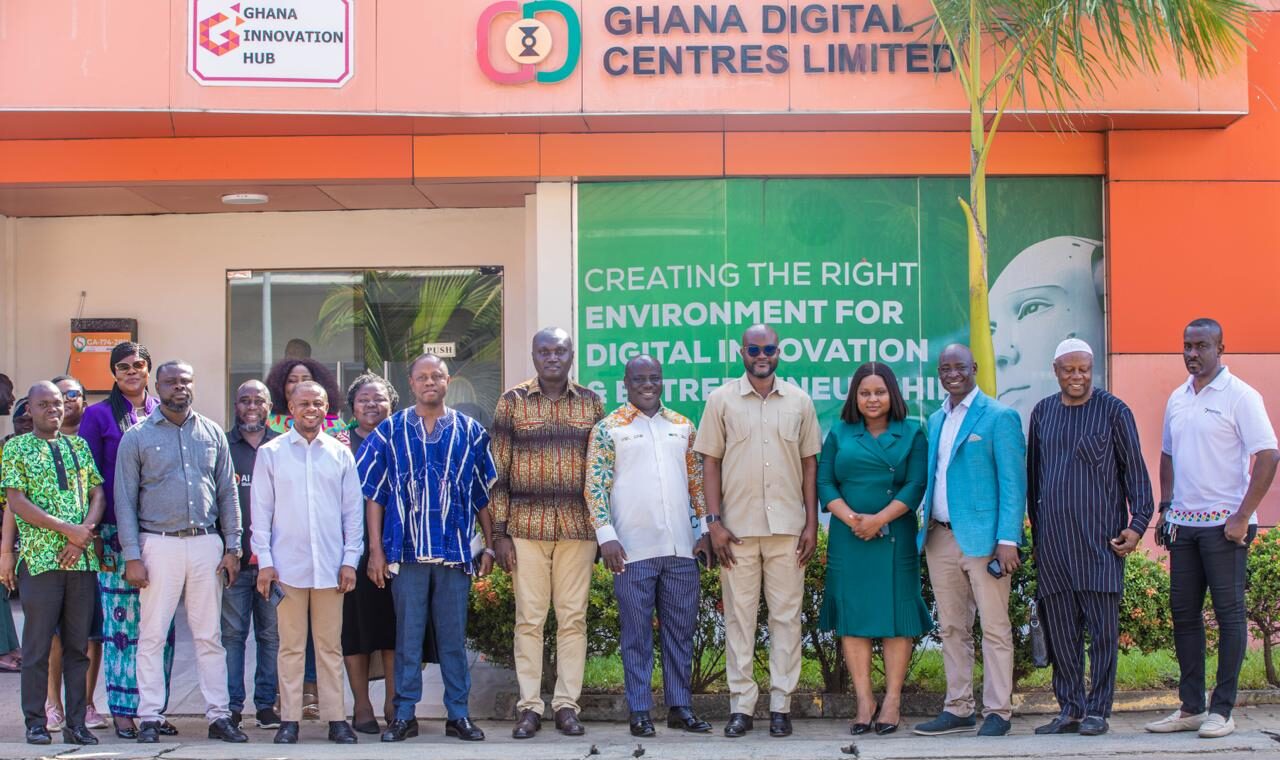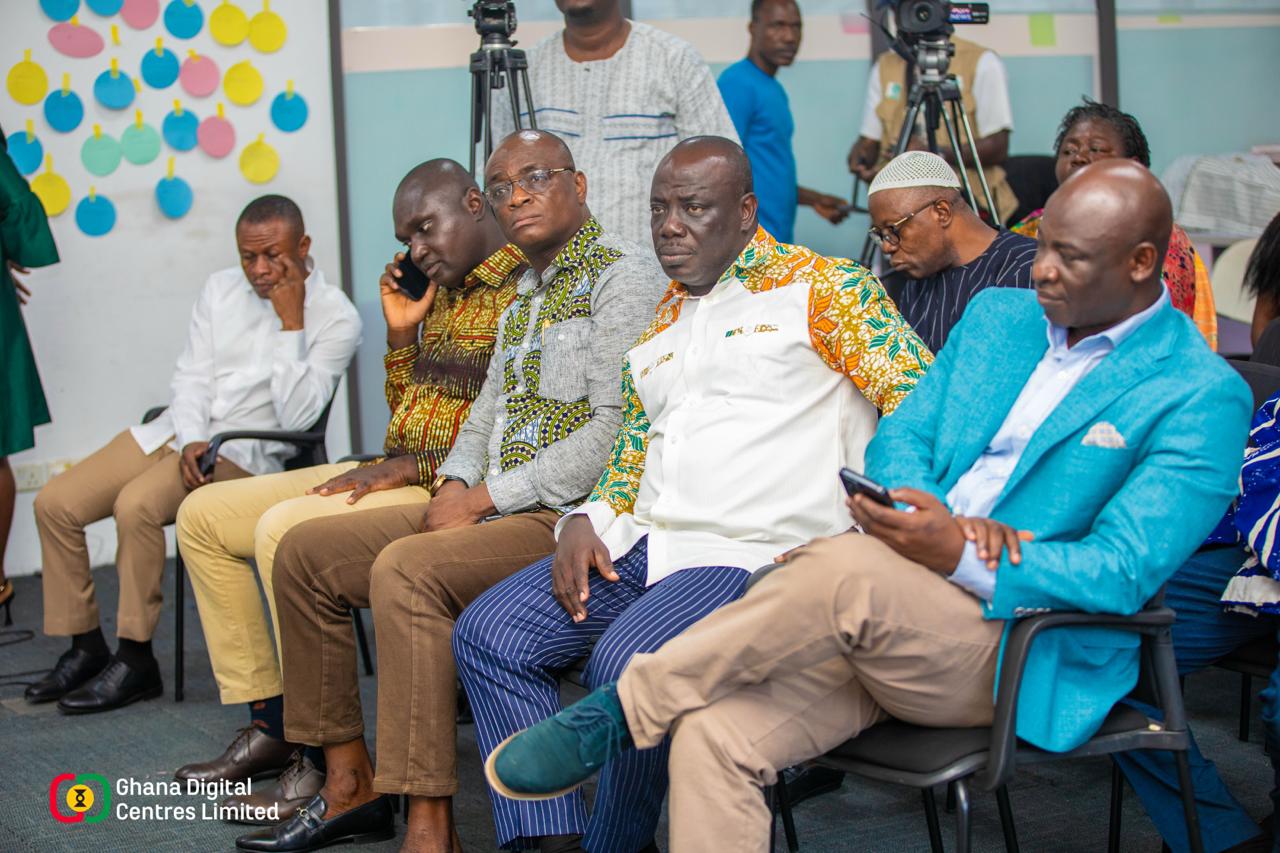When Hon. Bandum Lamangin Abed-Nego led members of Parliament’s Select Committee on Communications, Digital Technology, and Innovations through the doors of Ghana Digital Centres Limited last Friday, it wasn’t just another routine parliamentary oversight visit. It was a moment that could reshape the future of digital innovation in Ghana, and by extension, the economic opportunities available to every Ghanaian, from Accra to Wa, from Tamale to Cape Coast, to Ho.
Let me be direct about something: the Ghana Digital Centres have so much potential. But potential alone doesn’t create jobs. It doesn’t train young people. It doesn’t put food on tables or transform communities. What transforms potential into reality is action, support, and the kind of political will that can only come when our legislators truly understand what we’re building here and why it matters.

Over the past ten years, GDCL has quietly become one of the most important engines of digital job creation in this country. The numbers tell a compelling story. We’re hosting over 60 technology companies under one roof. These aren’t startups tinkering with apps; these are businesses creating real employment. Through the ICT and BPO firms operating at our centre, we’ve generated over 3,000 digital and ancillary jobs. That’s 3,000 families with income, 3,000 young Ghanaians who didn’t have to leave the country to find opportunities in tech.
We’ve incubated and supported more than 500 startups. Think about that for a moment. Five hundred entrepreneurial dreams given a fighting chance. Five hundred Ghanaian solutions to Ghanaian problems. And we’ve trained over 10,000 young people in digital programmes, equipping them with skills that are increasingly essential in our modern economy.

But here’s what keeps me up at night: we’re operating at over 60% capacity in our Accra facility, and the demand keeps growing. Young entrepreneurs are literally being turned away because we don’t have enough space. Companies want to set up BPO operations but we lack the infrastructure to accommodate them all. This is a good problem to have, but it’s still a problem that needs solving.
When I addressed the parliamentary committee, I didn’t sugarcoat our challenges. Yes, it’s a ten-year-old building that needs maintenance and renovation. But beyond infrastructure, we’re grappling with inadequate funding for our programmes and projects. The demand for office space is outweighing our current supply. We have limited collaboration with other government agencies when we should be working hand-in-glove across ministries. And we lack the vehicles needed to support the centre’s operations effectively. Try running a national digital innovation hub without reliable transport and you’ll understand the daily frustrations we face.
This is why Friday’s visit mattered so much. Our Business Development Manager, Edward Aikins, walked the committee through not just our achievements but our vision for what Ghana could become. He presented a roadmap that includes formally assigning operational management of Regional Digital and Innovation Centres to GDCL. Imagine what we could do if we replicated this model across the country. A digital centre in Tamale training young people in software development. A BPO hub in Kumasi creating thousands of call centre jobs. An innovation space in Takoradi helping entrepreneurs in the Western Region access the same opportunities available in Accra.
Hon. Bandum Lamangin Abed-Nego grasped this vision immediately. His comment about exporting products from our incubator programmes struck a chord with me. “Gari and other local products, well packaged, can be exported to London, for example, therefore giving the people more opportunities,” he said. He’s absolutely right. Digital innovation isn’t only about coding and software. It’s about using technology to add value to everything we produce as a nation. It’s about a farmer in the Northern Region using our e-commerce training to sell shea butter internationally. It’s about a seamstress in James Town using digital marketing skills learnt at our centre to attract customers from the diaspora.
The committee also heard our recommendation to establish BPO and KPO service support through designated special economic zones in partnership with the Ghana Free Zones Authority. We need to create an environment where international companies choose Ghana as their destination for outsourcing services. Do you know how many jobs India and the Philippines have created through their BPO industries? Hundreds of thousands. Ghana has educated, English-speaking youth who are just as capable. We just need the right policy environment and infrastructure to compete.
Our partnership ecosystem is already impressive. We work with the World Bank Group, JICA, Intrinsic Innovations, GIZ, MTN, Telecel, ITU, and academic institutions like KNUST, Academic City University, and the University of Ghana. Through GODEP, we’re partnering with Oracle Corporation to give Ghanaian startups access to world-class cloud technology. Through MASHAV, we’re leveraging Israeli and German expertise in technological cooperation. Through TDIP, we’re connecting university students with real-world innovation opportunities.
But partnerships alone aren’t enough. We need government backing. We need the resources to expand. We need commitment to make digital innovation a true national priority.
With support from government and donor partners, the centre can replicate the same Accra Digital Centre model in different regions, thereby creating jobs and opportunities for the Ghanaian people. We have to democratise access to the digital economy. We also have to ensure that a brilliant young programmer in Bolgatanga has the same shot at success as one in East Legon.
Every country that has successfully transitioned to a knowledge-based economy has made deliberate investments in digital infrastructure and innovation. South Korea didn’t become a tech powerhouse by accident. Estonia didn’t become Europe’s digital leader through luck. They made strategic choices, backed by sustained investment.
Ghana stands at a similar crossroads. We have the talent. We have the ambition. We have working models like GDCL that prove what’s possible. What we need now is the collective decision to scale what works.
The committee’s visit was encouraging because it showed genuine interest in understanding both our successes and our struggles. Hon. Owiredu Asuako Charles, Hon. Alhassan Umar, Hon. Djabab Kofi Nelson, Hon. Matthew Nyindan, and the other members asked probing questions. They toured our facilities. They met with some of the companies and startups we’re supporting. They saw firsthand what we’re building.
Now comes the critical part: translating that understanding into action. We need the operational vehicles that will allow us to effectively manage multiple centres across Ghana. We need the ownership transfer from the Ministry of Works and Housing to the Ministry of Communications, Digital Technology, and Innovations finalised so we can operate with clarity and efficiency. We need the funding to maintain and expand our infrastructure. We need the policy support to strengthen programmes like our one million coders initiative, which aims to train a generation of Ghanaian youth in digital skills.
These aren’t luxuries. They’re necessities if we’re serious about competing in the global digital economy. While we deliberate, other African nations are moving aggressively. Rwanda is positioning itself as Africa’s tech hub. Kenya’s tech ecosystem continues to grow. Nigeria’s tech sector is attracting billions in investment. Ghana has every advantage these countries have, and in some cases more. But advantages mean nothing if we don’t leverage them.
To every Ghanaian reading this: the digital economy isn’t some abstract concept happening somewhere else. It’s happening right here, right now. The jobs being created at GDCL are Ghanaian jobs. The startups we’re incubating are solving Ghanaian problems. The young people we’re training are your children, your neighbours, your relatives. When GDCL succeeds, Ghana succeeds. When we create a thriving digital innovation ecosystem, every sector of our economy benefits.
This is why Parliament’s visit mattered. Because change begins with understanding, and understanding, when coupled with action, leads to transformation. The members of the Select Committee left our centre with a clearer picture of both what we’ve achieved and what we need to achieve more. They saw the potential. They heard the challenges. Now it’s up to all of us, working together, to turn that potential into prosperity for every Ghanaian.
The digital future is already here. The only question is whether Ghana will lead or follow. I believe we can lead. But we can’t do it without the support and commitment of our parliament, our private sector partners, and every Ghanaian who believes our young people deserve opportunities at home, not just abroad.
That’s why Friday’s visit mattered. And that’s why what happens next matters even more.



















